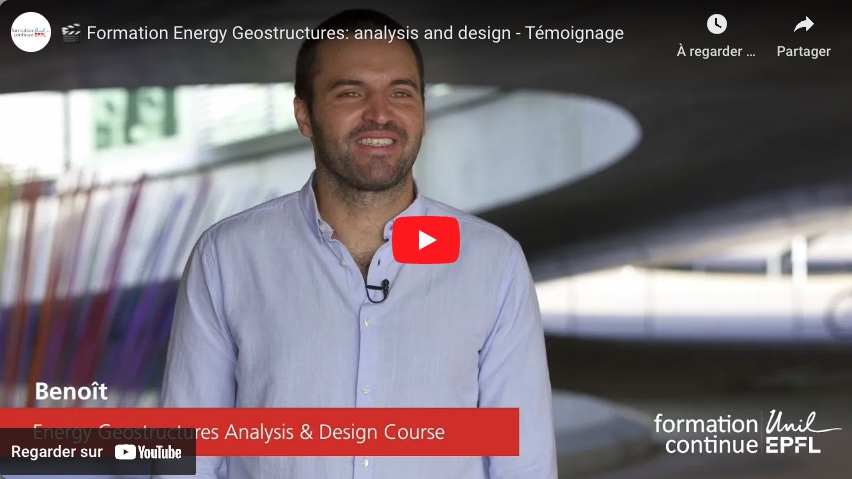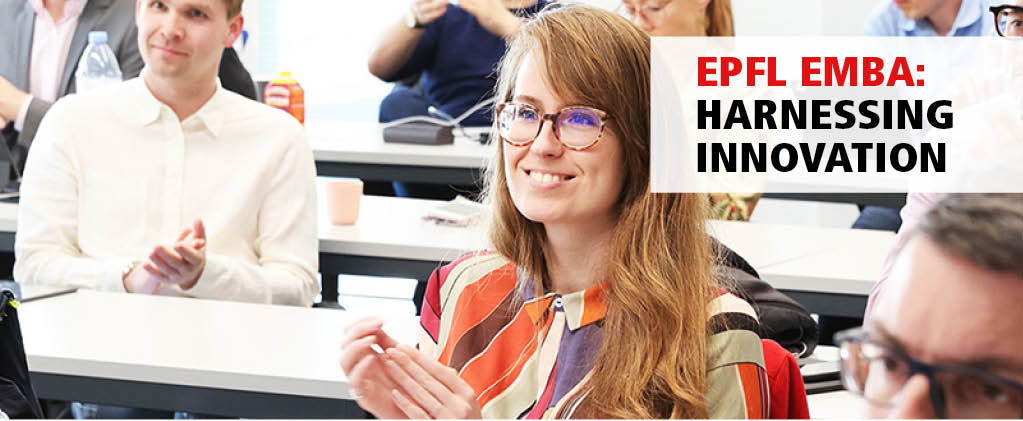Target audience
Professionals – such as civil and energy engineers, architects, urban project managers or geologists – and scientists who want to acquire knowledge on the energy, geotechnical and structural performance of energy geostructures.
The course will be given in English. This programme is also available in French. Click here for more information.
Requirements
- No specific experience with energy geostructures is needed.
- Basic knowledge of soil and structural mechanics.
Participants should bring their own laptop (for use during the practical application exercises)
Overview
The application of environmentally friendly technologies that exploit renewable energy sources is key to follow international agreements for the development of low-carbon buildings and infrastructures.
Energy geostructures are an innovative, multifunctional technology that can be used to address the aforementioned challenge. By coupling the role of the ground structures with that of the geothermal heat exchangers, energy geostructures can serve as structural supports as well as heating and cooling elements for buildings and infrastructures.
How can energy geostructures be analysed and designed from a geotechnical and structural point of view? What will be the energy performance of energy geostructures over time?
Objectives
- Understand the thermal and mechanical behaviour of energy geostructures, with reference to the latest scientific achievements
- Be able to perform the energy, geotechnical and structural design of energy geostructures
- Learn how to exploit current standards available at the European level (e.g., the so-called “Eurocodes”) for the design of energy geostructures
- Experiment with practical exercises all the key steps involved in the analysis and design process of energy geostructures
- Learn on some practical examples of recent projects worldwide
Programme
Day 1
- Underground means new perspective
- Geothermal and waste thermal energy: principles and opportunities
- Energy geostructures in new and existing constructions
- Construction of energy geostructures
Day 2
- Energy geostructures in arid climates
- Energy analysis and design of energy piles
- Energy analysis and design of other energy geostructures
- Development of energy geostructures in temperate climates
Day 3
- Energy geostructures in continental climates
- Geotechnical and structural analysis and design of energy piles
- Geotechnical and structural analysis and design of other energy geostructures
- Practical energy, geotechnical, and structural design of energy piles
Teaching approach
- Optimum balance between theory and practice (application sessions including analytical and numerical simulation exercises)
- Teaching based on cutting-edge scientific achievements
- Case studies based on real energy geostructure projects, for which the Programme Directors worked as expert consultants
Participant Testimonial
Certification
A certificate of attendance will be delivered at the end of the course.
Organisation
Laboratory of Soil Mechanics (LMS), Swiss Federal Institute of Technology Lausanne (EPFL)
Programme Directors
- Prof. Lyesse Laloui, Ph.D.
Swiss Federal Institute of Technology Lausanne (EPFL), Switzerland - Prof. Alessandro F. Rotta Loria, Ph.D., P.E.
Northwestern University, Chicago, U.S.A.
Invited speakers
- Ms. Antonia Cornaro
Underground construction expert, Amberg Engineering, Switzerland - Mr. Tony Amis
Energy expert, GI-Energy, U.S.A. - Mr. Nicolas de Varreux
Shallow Geothermal S.M.E., ENOWANEOM, Saudi Arabia - Mr. Didier Mülhauser
Contractor expert, Marti SA, Switzerland - Mr. Luis de Pereda Fernández
Architect, ENERES, Spain
Practical information
Dates and schedule
- Monday November 4, 2024
- Tuesday November 5, 2024
- Wednesday November 6, 2024
From 9 am to 5 pm (UTC+2)
Course venue
Face-to-face (EPFL, Lausanne, Switzerland) or
Online: available between the 4th and 29th of November 2024
Course fee
1900.- Swiss Francs *, including:
- Course material
- Three-month license of academic version of the Thermo-Pile software
* 10% special discount for contributing members of EPFL Alumni
Registration deadline
September 16, 2024
Number of participants is limited
Useful documents and links
- EPFL News, 01.11.2019




